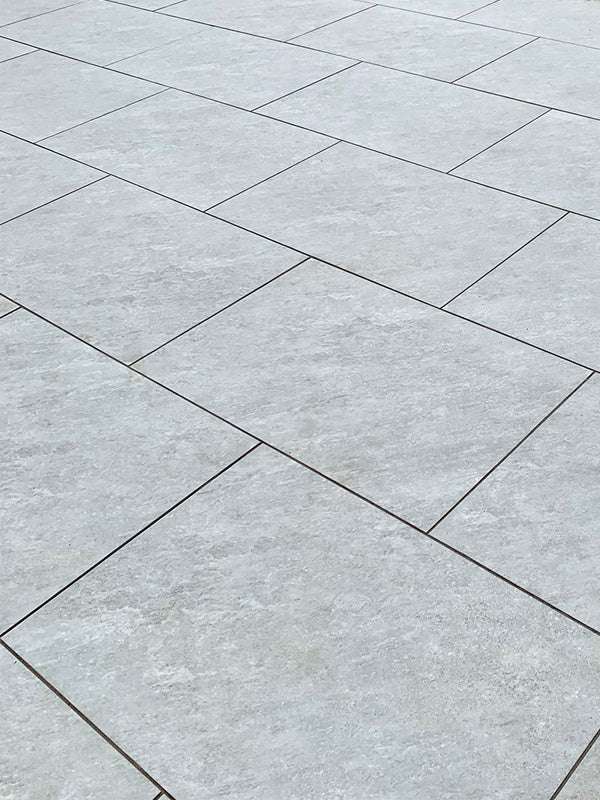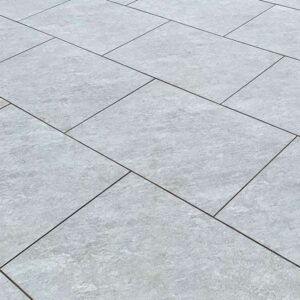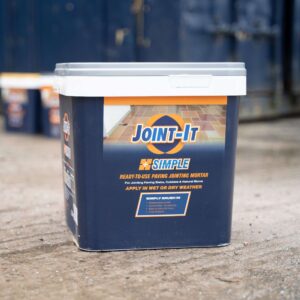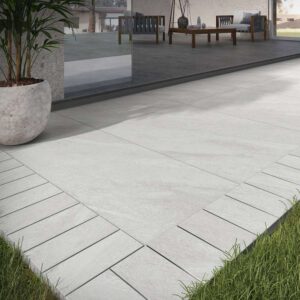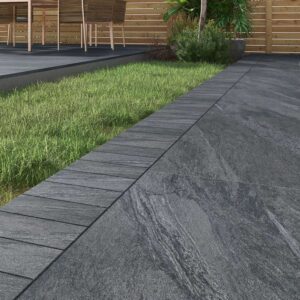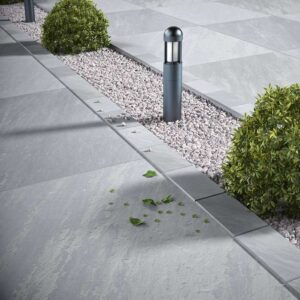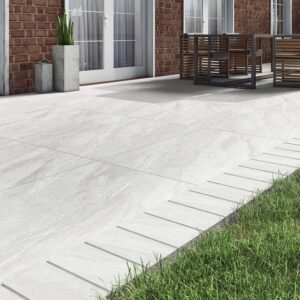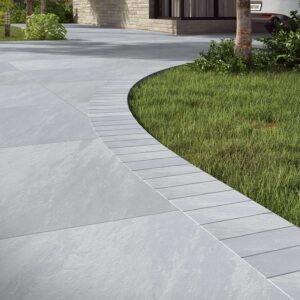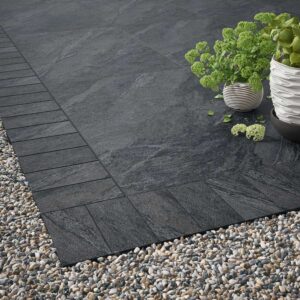Universal Grey Outdoor Porcelain Paving Tiles – 900x600mm – 20mm
From £24.84/m²
£350.00 – £559.00 inc. VAT
- Hard-Wearing & Highly Durable
- Stone Effect Textured Surface
- Looks Great Wet & Dry
- Low Maintenance
- R11 Non-Slip Rating
- Stain, Scratch & Shock Resistant
Pack Coverage:

FREE Delivery UK-wide*
Free shipping on all orders

Kerbside Pallet Delivery
Delivered via Palletways
Trade & Bulk Discounts
Up to £40 off per pack on all paving

Price Match Guarantee
We will not be beaten on price
Product Info
| Brand | Ammaari Stones © |
| Product | Paving Slabs |
| Material | Porcelain (Vitrified) |
| Thickness | 20mm |
| Surface | Stone Effect, Textured |
| Edges | Square |
| Colour | Universal Grey |
| Origin | India |
| Suitable For | Patios, Paths, Steps |
| Sealing | Not Required – Vitrified Porcelain |
| Frost Resistant | Yes |
| Slip Resistant | Yes |
| Scratch & Shock Resistant | Yes |
Pack Sizes
| Slab Size | 11.25m² | 22.5m² |
| 900x600mm | 20 slabs | 40 slabs |
Care Instructions
We recommend brushing away any dirt/debris from your paving slabs on a regular basis and washing the surface of the slabs when required. A regular spot clean with a seasonal power wash will keep your porcelain slabs looking brand new year-round.
We advise you to use warm soapy water with a stiff brush to scrub the surface of the paving. Do not use any acidic or acidic-based solutions when cleaning your porcelain paving slabs.
We're here to help
Frequently bought together...
You may also like...
Product Information
Product Info
| Brand | Ammaari Stones © |
| Product | Paving Slabs |
| Material | Porcelain (Vitrified) |
| Thickness | 20mm |
| Surface | Stone Effect, Textured |
| Edges | Square |
| Colour | Universal Grey |
| Origin | India |
| Suitable For | Patios, Paths, Steps |
| Sealing | Not Required – Vitrified Porcelain |
| Frost Resistant | Yes |
| Slip Resistant | Yes |
| Scratch & Shock Resistant | Yes |
Pack Sizes
| Slab Size | 11.25m² | 22.5m² |
| 900x600mm | 20 slabs | 40 slabs |
Care Instructions
We recommend brushing away any dirt/debris from your paving slabs on a regular basis and washing the surface of the slabs when required. A regular spot clean with a seasonal power wash will keep your porcelain slabs looking brand new year-round.
We advise you to use warm soapy water with a stiff brush to scrub the surface of the paving. Do not use any acidic or acidic-based solutions when cleaning your porcelain paving slabs.
900 x 600 porcelain paving specifications
Our porcelain garden tiles are the perfect addition to any garden or outdoor space, and are available in a range of stunning designs and colours to add a contemporary and modern feel to your patios. They are extremely strong and hard wearing and thanks to their low water absorption rate, they will repel moss, algae, and mould. Using pure kaolin clay and natural minerals, our outdoor porcelain paving tiles are fired at temperatures reaching 1200 degrees Celsius – making them harder and more durable than their natural stone alternatives.
Colours and designs
Our porcelain patio tiles are available in a wide range of colours to suit all tastes and designs to give you the perfect outdoor landscapes. If you are looking for something bright and contemporary, then take a look at our grey porcelain slabs 900 x 600 – these stunning tiles will lift any space and add a sophisticated look to your garden. If you are looking for something more modern and stylish then check out our dark grey porcelain paving slabs 900 x 600 – these dark coloured tiles will add a sense of luxury to your garden, and your eyes will instantly be drawn to your new space.
For those who are looking for a more country and rustic feel we also have a range of Indian porcelain paving slabs for you to choose from – add a sense of charm to your garden without the worry of maintaining natural stone!
No matter what you are looking for, whether it is Indian, black or porcelain grey patio slabs, we have a wide range of styles and colours at fantastic prices!
Why choose 900 x 600 paving slabs?
Apart from looking fantastic, our porcelain paving tiles have many additional benefits that you can enjoy, including:
- Anti-slip, anti-fade, and anti-frost – thanks to the high firing temperatures, your porcelain tiles will be able to withstand any weather conditions. You can enjoy your tiles in the snow or the rain thanks to the low water absorption rate (all our porcelain tiles have a slip rating of R11) and you don’t need to worry about them fading in the sun thanks to their printed designs.
- Low maintenance – there is no special method required to clean our porcelain tiles – all you need to do is use a power wash or warm water mixed with a PH neutral detergent. You also don’t need to treat the tiles before laying them – they are ready to go when you are.
- Robust and durable – porcelain tiles are extremely strong, robust and hardwearing thanks to the high firing temperatures used in the manufacturing process. This means that you don’t have to worry about chips or cracks once they have been laid, they will look brand new for years to come.
Natural Variation Information
All our porcelain tiles have been printed using special inks and have been designed not to fade when exposed to direct sunlight. As they are manmade, you also don’t need to worry about colour or texture variations – each tile bought in the same pack will be identical.
Specifications and Dimensions
Installation and Aftercare
With the right preparation and materials, installing our porcelain paving 900 x 600 tiles can be a breeze. You need to ensure that you handle all our porcelain patio tiles with care and attention to avoid breakages and give your garden the best possible look.
To begin, you will need to mark out the area you wish to pave and remember to add extra space and tiles to compensate for any accidental breakages when you are pricing up. You will then need to dig out the ground and create a base that is roughly 15-20mm deep. This base should be even and solid to give you the best structure for your 900 x 600 porcelain paving, and you may need to add a thin layer of sand or fine gravel to even out the surface.
Once the base is ready, you will need to add a layer of mortar onto the compressed soil or sand. You will also need to use a priming slurry on your tiles to ensure that the bond is as securely as possible between the base and the tiles. You can then begin to lay your tiles and arrange them in the pattern that you want. Once the tiles have been laid, you will need to use an exterior grout to keep your tiles secure and safe. While it can be rewarding to lay your own porcelain paving slabs 900 x 600, if you are unsure about anything it is always best to consult an expert.
If you want to keep your new patio or driveway looking brand new, we recommend that you clean away debris with warm water regularly. You should also use a power wash or a PH neutral detergent with water once or twice a year to keep your tiles looking sparkling.
FAQs
Is porcelain good for paving?
Porcelain is extremely good for patio paving, not only is it durable, low maintenance and aesthetically beautiful, but you can also get fantastic offers that are more cost-effective than using natural stone. Porcelain paving also offers stain resistance, slip resistance and frost resistance – so you know that your patio will withstand all weather conditions.
How long does porcelain paving last?
One of the main benefits to using porcelain paving is its good longevity. Providing you choose high quality porcelain tiles and have them laid properly with a good bedding, your porcelain paving can last you many decades (up to 50 years).
Can you power wash porcelain tiles?
As porcelain tiles are durable, hard wearing and stain resistant, power washing is the recommended form of cleaning. You will not need to give porcelain tiles any special attention, and you will not need any special cleaning products. All you need to do is power wash your tiles once or twice a year to keep them looking brand new.
Is porcelain paving slippery when wet?
Unlike natural stone, porcelain tiles are non-porous, and they do not attract algae, moss, or mould. While they are extremely slip resistant, porcelain paving can still get slippery when it is wet or icy, as any outdoor surface can. During harsh weather conditions, you will still need to be careful when walking on porcelain paving.
Can I use porcelain tiles outside?
In short, yes – porcelain tiles are perfect to use outdoors and are extremely suited to the British weather conditions. Due to the manufacturing process, porcelain paving tiles are strong and hard wearing, and compared to natural stone or concrete slabs, porcelain requires very little cleaning to maintain.
What do you put under porcelain tiles outside?
You will need to lay your porcelain tiles onto a fresh bed of mortar to ensure that the tiles are secure and will not come loose. You will also need to make sure that you have prepared the ground underneath the mortar correctly, as porcelain tiles require a stronger bond than natural stone to keep them in place.
Can porcelain be laid directly onto concrete?
Yes, in most cases you will be okay to lay your porcelain tiles directly onto concrete instead of soil or another base. You will need to ensure that the concrete surface is free from any dust, moisture, and debris as these can prevent the tiles from bonding. You will also need to ensure that the concrete is in good condition before you begin to lay your porcelain tiles.
What do you put under porcelain tiles outside?
You will need to lay your porcelain tiles onto a fresh bed of mortar to ensure that the tiles are secure and will not come loose. You will also need to make sure that you have prepared the ground underneath the mortar correctly, as porcelain tiles require a stronger bond than natural stone to keep them in place.
Can porcelain be laid directly onto concrete?
Yes, in most cases you will be okay to lay your porcelain tiles directly onto concrete instead of soil or another base. You will need to ensure that the concrete surface is free from any dust, moisture, and debris as these can prevent the tiles from bonding. You will also need to ensure that the concrete is in good condition before you begin to lay your porcelain tiles.
Do porcelain paving slabs stain?
Due to their strong glazed surface, porcelain tiles are extremely stain resistant and have a low water absorption rate. These characteristics mean that staining is rare, and the only cleaning that they require is washing with water or a diluted neutral detergent. Some stubborn marks may need a bit of elbow grease to get rid of them, but they will look brand new in no time.
How much does porcelain paving cost?
Porcelain paving slabs in general are cheaper than natural stone, but slightly more expensive than concrete flags. The cost has come down over the years for porcelain paving tiles, and the number of benefits you have over choosing porcelain greatly outnumber saving a little bit if you opt for concrete flags.
What is ‘vitrified’ porcelain paving?
Vitrified porcelain paving refers to the type of paving tile that is made from pure kaolin clay mixed with minerals, including quartz and feldspar. It is then fired at 1200 degrees Celsius, making vitrified porcelain tiles very hard and extremely durable. The high firing temperatures also ensure that vitrified porcelain tiles have a low water absorption rate.
What is the best way to lay porcelain paving slabs?
You will need to ensure that the ground is solid and even before you lay your porcelain slabs, and this may mean using sand or fine gravel before you start. You will need the correct mortar mixture and you will need to prime your tiles before you begin to lay them. Finish them off with exterior grouting to ensure your tiles are securely in place.
Can you have a porcelain driveway?
As porcelain tiles are hardwearing, durable and slip resistant, they are the perfect option if you are looking for an attractive alternative to natural stone driveways. You can purchase porcelain tiles in thicknesses up to 30mm, and their additional strength means they will offer an ideal laying solution to your driveway.
How do you cut porcelain paving slabs?
If you are looking to cut porcelain paving slabs, then the only effective way is to use a diamond wet blade saw. You will not be able to use hand tools or basic blades to cut through porcelain tiles due to their strong and hard wearing properties, even if they are marked as suitable for cutting through hard materials.
What’s special about these tiles?
Porcelain tiles are denser than ceramic tiles, and they are a non-porous material. This combination means that they are extremely hard wearing, durable, and slip resistant as they repeal moss and algae. These strong properties make porcelain tiles perfect for outdoor areas that will see a lot of heavy footfalls, while still looking stunning.
Should I select a smooth or textured surface?
There are pros and cons to both smooth and textured porcelain tiles – smooth tiles are easier to clean whilst textured tiles over more traction. If you are looking to use porcelain tiles outdoors, for example on a patio or driveway, generally people will use textured tiles so that they have more slip resistance when it is raining or snowing.
What laying pattern should I choose?
There are 4 main laying patterns that you can choose from when laying your outside tiles. A random laying pattern will give a more rustic feel, a stack bond paving laying pattern is very uniform and looks like a chessboard, a stretcher bond laying pattern is one of the more simpler laying patterns and is also known and the running bond, and finally the herringbone laying pattern is the traditional laying pattern for single, rectangular tiles.
Is porcelain better than sandstone?
Your outdoor space paving is purely down to personal preference, but both porcelain and sandstone have pros and cons. Porcelain is durable, hardwearing and will not fade in the sun, but the installation can be tricky. Sandstone is long lasting, eco-friendly and easy to maintain, however they have a high water absorption rate and can get scratched easily.
Is it safe to clean my tiles with household bleach?
While using a household bleach diluted with water will not affect the properties of your tiles and cause them to break or crack, the acid in the bleach may alter the colour of your tiles or stain the grout. Instead, use a diluted PH neutral cleaner or a pressure washer to clean your outdoor porcelain tiles.
Is porcelain porous?
Porcelain tiles are made from clay and other natural materials. These are blended together and fired at extremely high temperatures, making them well known for being highly uniform and non-porous. This means that they have a low water absorption rate and will repel moss, algae, and mould.
How thick are porcelain paving slabs?
The standard thickness of outdoor porcelain paving slabs is usually 2cm (20mm) thick, and this is usually sufficient if you are looking to pave patios, terraces, and pathways. You can get porcelain paving slabs up to 30mm thick, and you should consider using these thicker porcelain paving slabs if you are looking to pave your driveway.
Does porcelain paving fade?
Unlike other natural stone paving, porcelain paving tiles do not fade or change when they are exposed to direct sunlight over a long period of time.


